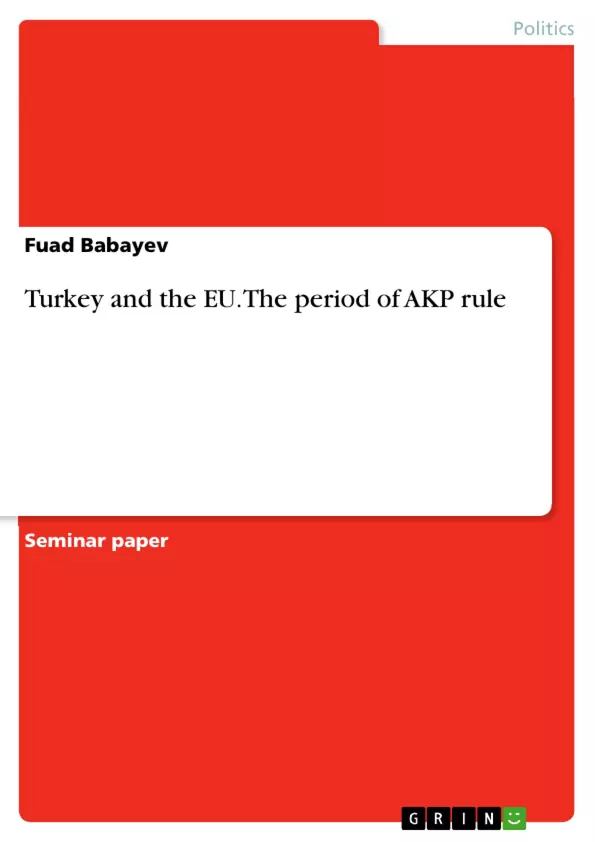The political and economical relations between Turkey and European countries date back to 11 century when Turks migrated from Asia to Anatolia and later conquered Constantinople establishing Ottoman Empire. Since then Turks became familiar with European culture and political, economical system of European countries. There were always conflicts between Turkey and European countries because culture and religion divided them deeply. After collapse of Ottoman Empire Turkey chose a different path for the future of the country under leadership of Mustafa Kamal Pasha Ataturk. It was European integration which actually started on 31 July of 1959 when Turkey applied for associate membership in European Community. In 1963 Ankara agreement was signed in this regard which strengthened Turkish and European relations. An important aspect that made EU and Turkey closer during this period was threat of Soviet Union and collaboration within the framework of NATO.
Inhaltsverzeichnis (Table of Contents)
- Introduction
- AKP rule in Turkey
- Turkish economy and Europe
- The impact of Kurdish issue to EU and Turkish relations
- Conclusion
Zielsetzung und Themenschwerpunkte (Objectives and Key Themes)
This text explores the political and economic relations between Turkey and the European Union, focusing on the period of AKP rule in Turkey. It aims to analyze the impact of AKP's policies on Turkey's economic development and its relationship with the EU.
- The role of AKP in shaping Turkey's political and economic landscape
- The impact of AKP's policies on Turkish economy and its integration with Europe
- The challenges and opportunities of Turkey's EU accession process
- The significance of the Kurdish issue in shaping Turkey's relationship with the EU
- The historical and cultural factors shaping Turkish-European relations
Zusammenfassung der Kapitel (Chapter Summaries)
- Introduction: This chapter sets the historical context for Turkey's relations with European countries, tracing them back to the Ottoman Empire. It highlights the cultural and religious divides that have influenced their relationship and examines Turkey's path towards European integration starting from its application for associate membership in the European Community in 1959.
- AKP rule in Turkey: This chapter focuses on the rise of the Justice and Development Party (AKP) in 2002 and its impact on Turkey's political and economic system. It analyzes AKP's policies, including its approach to Islam, its commitment to neoliberalism, and its efforts to integrate Turkey into the global economy. It also discusses AKP's reforms related to privatization and its adherence to IMF demands.
- Turkish economy and Europe: This chapter examines the economic relationship between Turkey and the EU from a European perspective. It highlights the significance of the Customs Union agreement in 1995 and its impact on trade between the two entities. The chapter also discusses the demographic factors, particularly the young population of Turkey, and its implications for future economic growth.
Schlüsselwörter (Keywords)
Key topics and terms explored in the text include AKP rule, Turkish economy, EU accession, globalization, neoliberalism, privatization, Customs Union, Kurdish issue, historical and cultural factors, trade, migration, demographic trends, and Turkish-European relations.
Frequently Asked Questions
When did Turkey's integration process with Europe begin?
The formal process began on July 31, 1959, when Turkey applied for associate membership in the European Community. This was followed by the Ankara Agreement in 1963.
How has the AKP influenced Turkey's economy?
Since coming to power in 2002, the AKP has focused on neoliberal reforms, privatization, and integrating Turkey into the global economy, often following IMF recommendations.
What is the significance of the Customs Union?
The 1995 Customs Union agreement significantly strengthened trade relations between Turkey and the EU, making the EU Turkey's most important economic partner.
What role does the Kurdish issue play in EU-Turkey relations?
The Kurdish issue is a major political challenge that impacts human rights discussions and remains a critical factor in Turkey's EU accession negotiations.
What historical factors divide Turkey and Europe?
Historical conflicts, differing religious backgrounds, and cultural differences dating back to the Ottoman Empire have created long-standing tensions alongside the drive for integration.
- Quote paper
- Fuad Babayev (Author), 2013, Turkey and the EU. The period of AKP rule, Munich, GRIN Verlag, https://www.grin.com/document/413446



